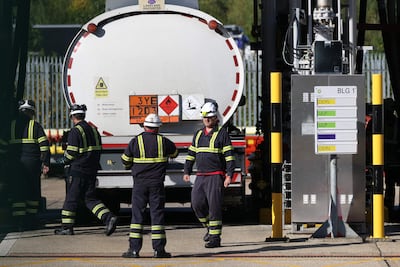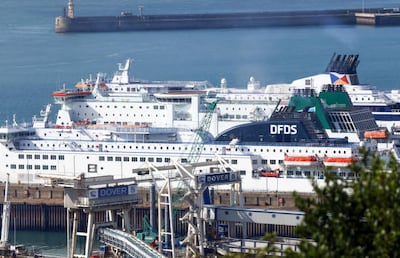Shipping bosses have predicted that disruption to the UK supply chain will continue “well into next year” as a shortage of lorry drivers is causing a bottleneck at ports and forcing freight companies to divert goods.
Maersk, the world’s largest cargo company, has rerouted its ships from Felixstowe, the UK's biggest container port after some were waiting up to seven days to be offloaded.
The backlog has been caused by a lack of heavy goods vehicle drivers to transport imported items from the port in Suffolk, south-east England, which handles 36 per cent of UK freight.
Other ports across the UK are also affected by bottlenecks, prompting warnings for shoppers.
Lorry driver shortages last month led to a fuel crisis when companies rationed deliveries of petrol and diesel to forecourts and motorists had to queue for hours to fill their tanks.
John Grange, director of Grange Shipping in Felixstowe, told The National that the problems causing the backlogs have existed for months but were exacerbated by a lack of lorry drivers.
The company employs 29 logistical workers who are responsible for clearing goods through the port and booking drivers to move the freight onwards.
Mr Grange said the dearth of lorries available to pick up the cargo meant shipping companies incur additional storage costs as containers lie untouched for more than a week.
“Containers are very late being picked up," he said. "Most of the people here are rebooking drivers for the sixth or seventh time. It means customers do not get it for seven to 10 days.
“It started last year with the pandemic when people were put on furlough. It got considerably worse due to a shortage of drivers.”
He said the crisis stemming from low numbers of qualified drivers has been affecting his company and others for months but escalated "when people ran out of Haribo sweets".
Last month, a wave of panic buying at the pumps was sparked by BP's decision to ration fuel deliveries because it did not have enough drivers.
A Maersk spokeswoman said the ships, each carrying thousands of containers, were being redirected to continental ports such as Rotterdam and Antwerp.
Cargo would then be loaded on to smaller vessels to dock at other British ports, or at Felixstowe when space becomes free.
The spokeswoman said the company was committed to getting goods to Britain for "Black Friday” and Christmas.
Lars Mikael Jensen, head of global ocean network at Danish-owned Maersk, said the shortage of qualified drivers has slowed down the time it takes for containers to be emptied and picked up.
“We had to stop operations on a ship because there was nowhere to discharge the containers,” he said.
“Felixstowe is among the top two or three worst-hit terminals. We are having to deviate some of the bigger ships away from Felixstowe and relay some of the smaller ships for the cargo.

“We did it for a little while over the summer and now we’re starting to do it again.”
Howard Eve, logistics worker at Waller Transport Services in Felixstowe, said the haulage firm has been approached by many people who are unable to shift stock from the port owing to a lack of drivers.
He said the group uses subcontractors and has so far been able to help all companies get their goods delivered on time.
“A lot of companies cannot get drivers to employ but we have a database of subcontractors,” he told The National.
“When people cannot get to a driver they come to us and we source drivers. It’s not getting any better, it’s getting worse because of a shortage of drivers.”
Adam Searle, managing director of CP Transport, which operates lorries out of Felixstowe, told The National the backlog was having a “horrific” effect on his staff.
Mr Searle manages 75 lorries, both his own and those of subcontractors, to pick up cargo and transport it across the country.
He said last week that some shipping giants refused to accept empty containers on to vessels when they dock because they were already operating behind schedule.
This, he said, has had a major effect on his drivers who have no choice but to transport the containers to other ports, causing further delays to delivery.
If empty containers are not returned to their destinations, manufacturers may refuse to dispatch additional orders.
“When you cannot return the container to the port of origin it creates additional issues,” he said.
“Last week we had to return containers to Tilbury port. When it was full we had to take them to Liverpool port.
“It’s a five-and-a-half hour drive from Felixstowe to Liverpool. The additional time and costs are horrific.”
He said the port’s storage site for containers has been at 90 per cent capacity and drivers often find the goods they need to deliver buried under three or four other containers, causing further delays to their journey.
Last month retail company John Lewis said it had chartered extra ships to help deliver stock in time for the festive season.
“In common with other major ports in the UK and beyond, the port of Felixstowe is experiencing impacts of the global supply chain crisis," a spokesman for the port said.
“The vast majority of import containers are cleared for collection within minutes of arriving and there are over 1,000 unused haulier bookings most days.
“The situation is improving and there is more spare space for import containers this week than at any time since the beginning of July when supply chain impacts first started to bite.
“Empty container levels remain high as import containers are returned and we are asking shipping lines to remove them as quickly as possible.”
Tim Morris, chief executive of the UK Major Ports Group, said that trade ports had become “the jam in the sandwich between surging, volatile shipping and UK supply chains badly affected by factors such as HGV driver shortages”.
“Ports have taken significant action to respond to the challenges and build resilience," he said.

“They have extended gate opening to 24/7, increased capacity for lorries at peak hours, sought to maximise rail freight usage within the significant constraints of the network, created additional storage space and recruited more people.
“But the pressures are being exacerbated by well-publicised issues affecting all UK supply chains, notably shortages of HGV drivers.
“Ports therefore have to manage access to storage space very dynamically in extreme situations. This can mean some very limited short-term restrictions.
“Ports are committed to working closely with customers and entire supply chains to keep goods moving.”
And Peter Wilson, group managing director of Cory Brothers, warned of possible continued disruption to the supply chain over the coming weeks and months.
Speaking on BBC Radio Four’s Today programme on Wednesday, he said the “significant delays” blighting ports across the UK could potentially continue “well into next year”.
Mr Wilson said people preparing to celebrate Christmas should plan their shopping lists in advance to avoid disappointment.
“What I would say to the consumer is be sensible, think ahead, plan appropriately and order your Christmas goods and the items that you need in a timely fashion to ensure that you have them,” he said.
“I think that we will see things being delivered. There is a potential nearer to Christmas to see some items maybe not being available on the shelves. But this supply chain will not fail.”

The majority of toys imported into the UK pass through Felixstowe because they are non-perishable and it costs less to ship them in rather than fly them.
Containers holding electronics, bikes and homeware items are reportedly affected by the backlog.
But Oliver Dowden, co-chairman of the Conservative Party, said the UK government was “getting on with the job of addressing” the problems at ports by trying to fill the gaps in the market for lorry drivers.
He highlighted a visa scheme for 5,000 overseas lorry drivers to come to Britain to work, as well as measures aimed at making it easier for British residents to qualify as lorry drivers.
He said the shortage was “clearly a challenging problem” at ports, but said the UK was not alone in this problem as the US, China and some European countries were also suffering from not having enough drivers to meet demand.
“It’s all about this wider point, which is that we need to get the skills here, have those higher-paid jobs and actually the latest news just yesterday about increases in wages is a real example of how that strategy is working,” he told Sky News.
“The situation is improving. I am confident that people will be able to get their toys for Christmas.”
He urged shoppers to “buy as you do normally” in the run-up to the festive season.
Doug Bannister, chief executive of the Port of Dover, said there was “no congestion” and that people could count on the route functioning as the ferries always keep moving.
Asked about the suggestion of empty shelves at Christmas and how “Grinchy” he feels, Mr Bannister told Times Radio: “I don’t feel particularly Grinchy, but at the same time Felixstowe, London Gateway, Southampton, these big container ports, for the goods coming on the long supply routes, on these big ships from Asia and India and the Middle East, these are providing a lot of the goods that people want to have around Christmas time.”
He said he expected European goods to be on the shelves for Christmas.
“So I don’t feel particularly grumpy knowing our business, but I do wonder about if my wife needs to pre-buy some early Christmas presents for the kids.”

